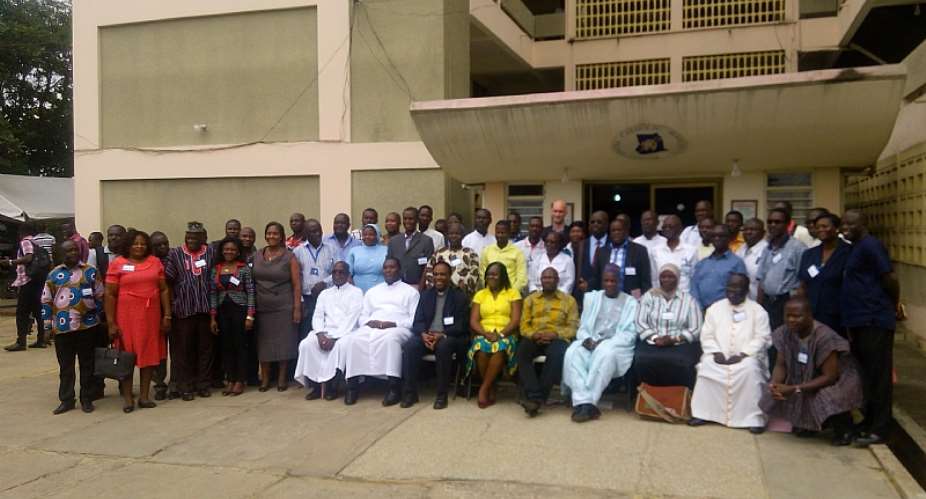Charitas Ghana report has described the rampant land grabbing spree as evil which has led to the major loss of livelihood and deaths in Ghana and Africa.
The 2016 Charitas Ghana report, which is a joint collaboration between the Ghana Catholic Bishops’ Conference and others, indicated that land grabbing has been the cause of so much confusion, conflicts and protracted disputes within and between families and communities.
Samuel Zan Akologo, Executive Secretary, Charitas Ghana indicated that inadequate land management and utilization policy coupled with previous economic development programmes largely influenced by external forces has created an environment for land grabbing in Ghana.
He said that land ownership in Ghana since the pre-colonial days has been chequered and plagued by a lack of comprehensive ownership information and use of outdated legislation.
Mr. Akologo said this at a ceremony to launch the 2016 report on “Unmasking Land Grabbing in Ghana; Restoring Livelihoods; Paving way for Sustainable Development Goals” in Accra.
Mr. Akologo indicated that the concept of land grabbing is not a recent phenomenon but long associated with land conversions in peri-urban areas where agriculture lands have been converted to residential use.
He noted that most of the peri-urban land conversions that take place at the fringes of cities lead to displacement of farmers who, in most cases, do not receive any compensation from the chiefs, queen-mothers or government.
“The continual neglect and displacement of the indigenous people especially as a result of the peri-urban land conversions has had significant effects on many livelihoods particularly women,” he stated.
Mr. Akologo posited that a 2010 report by the Friends of the Earth indicated that about 37 percent of Ghana’s crop land has been acquired by both foreign and local businesses for the cultivation of the Jatropha for biofuel energy.
He indicated that land owners were not getting their fair deals from these land conversions associated with the speculative use.
According to him, the Charitas report presents three case studies which demonstrates how land grabbing is a real threat to lives and livelihoods of especially those already at the margins of society and whose only coping mechanism is through their God-given resource of land.
He added the narrations of the cases of three communities, Okumaning, Babator and Brewaniase that are chilling and sometimes heart-breaking from the level of atrocities and fragrant disregard to people’s well-being.
Mr. Akologo indicated that the dynamics of land grabbing are tactfully driven and controlled by the foreign investors with their ability to exploit loopholes in national legal frameworks and the ignorance of communities.
He added that the potential for corruption, manipulation, threats and intimidation that pave the way for land deals in surreptitious circumstances.
Mr. Akologo noted that the report calls for the creation of awareness of communities on the dimension of land grabbing within communities as well as educate members of communities on their land rights.
“Contracts of land acquisitions that the government is involved should be made accessible and open to the community,” he intimated.
He calls for policy articulation and surveillance that guarantees livelihoods at all times.
Mr. Akologo further emphasized that the report provides lessons for the church in its attempt to tackle this menace in Ghana, from the adage “Forewarned is forearmed.”
Reverend Father Wisdom Larweh, Assistant Secretary of the National Catholic Secretariat reiterated Pope Francis’ proposals that “this should include analyses of the current situation; concrete proposals for dialogue and action, and consensus building.”
He added that the church wishes to encourage a dialogue, honest and open debate so that there can be a united effort at saving the earth which is our common good.





 NDC's hypocrisy exposed as party executive implicated in registration of minors
NDC's hypocrisy exposed as party executive implicated in registration of minors
 PDS Scandal: The totality of our loss is the mess we seen in the power sector to...
PDS Scandal: The totality of our loss is the mess we seen in the power sector to...
 Ghanaians deserve better than what Akufo-Addo’s ‘yenkendi’ and cronyistic gov’t ...
Ghanaians deserve better than what Akufo-Addo’s ‘yenkendi’ and cronyistic gov’t ...
 2024 election: Bawumia is the man of the moment with his campaign style – Koku A...
2024 election: Bawumia is the man of the moment with his campaign style – Koku A...
 Election 2024: Choose to transfer power to us peacefully in your own interest — ...
Election 2024: Choose to transfer power to us peacefully in your own interest — ...
 What's the point in passing RTI law if you can't adhere to it? — MFWA quizzes Ak...
What's the point in passing RTI law if you can't adhere to it? — MFWA quizzes Ak...
 US Millennium Compact: It's disheartening for Ghana to lose $190 million power d...
US Millennium Compact: It's disheartening for Ghana to lose $190 million power d...
 My next administration will conduct a thorough investigation of PDS scandal — Ma...
My next administration will conduct a thorough investigation of PDS scandal — Ma...
 Extend deadline for limited voter registration in various university campuses — ...
Extend deadline for limited voter registration in various university campuses — ...
 May 10: Glovo closes Ghana operations, ceases services by 10pm
May 10: Glovo closes Ghana operations, ceases services by 10pm
